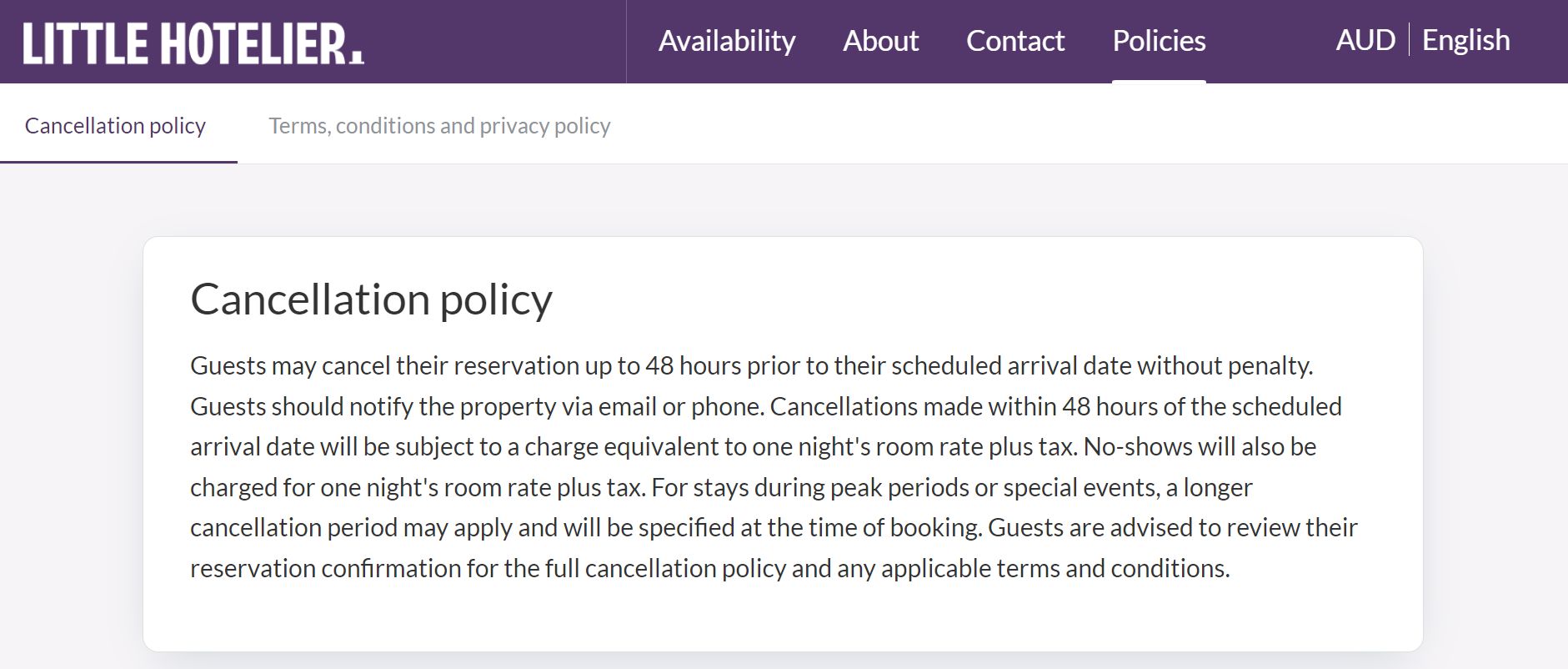What is a hotel cancellation policy?
Hotel cancellation policies offer hotel guests the opportunity to cancel their booking up until a certain amount of days before check-in. Once this date has passed, the hotel might charge the guest a set cancellation fee, a percentage of the booking, or the full amount.
Never stress over a cancellation again
Beautifully display your hotel cancellation policy in a direct booking calendar that allows you to send personalised emails automatically.
Learn moreA booking cancellation policy serves two main functions:
- It holds guests accountable, and ensures that they only book a hotel room when they actually intend to stay (rather than booking a room ‘just in case’, or reserving two options for the same date).
- It helps to reduce the number of no-shows, ensuring that a hotel doesn’t lose too much revenue from avoidable vacancies.
The importance of having a clear booking cancellation policy
Your booking cancellation policy must be made crystal clear during the hotel reservation process. Your cancellation policy is essentially a legal document – if it is vague, incorrect or offers any wiggle room, resourceful guests may find loopholes and leave you out of pocket.
But while your hotel booking cancellation policy needs to be legally sound, it can’t be written in lengthy legalese. Your average guest needs to understand it easily, and the most important terms – the timeframes and applicable cancellation fees – need to be displayed clearly.
Example of a hotel cancellation policy

Types of hotel cancellation policies
As a hotelier, you have the choice of a number of different cancellation policy options. Ten of the most common include:
1. Free cancellation policy
Three decades ago free cancellations of reservations in hotels were common, but they are now a rarity, as the internet has made it far quicker and easier to book a hotel, which has increased instances of travellers making bookings ‘just in case’.
2. Non-refundable policy
Sitting at the opposite end of the spectrum, a non-refundable cancellation policy takes full payment from the customer. Hotels may choose to implement this policy when a guest decides to cancel particularly late, such as in the 24 hours before check in.
3. Partially refundable policy
More common than non-refundable policies, partial refund policies see the guest refunded a percentage of the total reservation value in the days leading up to their stay. This percentage may decrease as check-in approaches.
4. One night penalty
Another common form of partial refund, ‘one night penalty’ policies see the guest charged for the first night of their cancelled stay.
5. No-show policy
Sometimes guests won’t cancel, but will simply fail to show up. In these cases a hotel might choose to charge the full total, a percentage of the total, one night, or a set cancellation/no-show fee.
6. Group cancellation policy
Hotels stand to lose more on group cancellations than individual cancellations, so may choose to implement a stricter policy for groups, e.g. a non-refundable policy that stretches 14 days before check-in.
7. Minimum stay policy
Many hotels have a minimum stay policy, particularly during peak periods. In cases of cancellation, no shows or if a guest wants to cut their stay short, a hotel may choose to base the cancellation fee on the minimum stay.
8. Seasonal cancellation policy
Similar to minimum stay policies, seasonal cancellation sees a hotel’s cancellation policy tighten during peak periods, to ensure the property minimises losses during the most profitable times of year.
9. Force majeure policy
Hotels will often be more lenient when the cancellation is out of the guest’s hands. Force majeure policies cover cancellations due to natural disasters or government restrictions, such as those during COVID. Force majeure cancellations are generally free.
10. Special event cancellation policy
If a guest is hosting a special event at a hotel, such as a wedding or business conference, stricter cancellation policies will usually apply.
Key components of a hotel cancellation policy
Your hotel cancellation policy must be easily accessible to all guests. It should be displayed prominently on your website, in your hotel booking process flow, and as a link on your booking confirmation email. In terms of the content, it should feature the following elements:
- Deadlines: You need to be clear on when cancellation fees will begin to incur. State the requirements and deadline for free cancellation, and describe further deadlines that may change the level of cancellation fee.
- Cancellation fees: Clearly state the cancellation fees that a guest will face at different deadlines and in different situations.
- Deposit: If you don’t take payment for the full booking amount upfront, state how much the deposit will be, and the degree to which it is refundable/non-refundable.
- Refund policy: Describe exactly how and when refunds will be issued.
- No-show policy: Describe fees/refunds in cases where a guest simply doesn’t show up.
How to handle hotel cancellations and rebookings
Now that we understand the ‘what’, let’s look at the ‘how’: how should you handle booking cancellations? While it’s tempting to avoid losing money by being as strict as possible, it’s wise to take a longer-term view.
If a guest has to cancel, for whatever reason, and you enforce a particularly harsh cancellation policy, it can leave a bad taste in their mouth. You can do damage to your reputation, even if you stated your policy very clearly before they booked.
This is why most large hotel chains tend to offer free cancellation up to 24 hours before check-in – they realise the value of making fans by being flexible and understanding.
As a compromise, rather than issuing a refund, consider issuing a credit that allows the customer to rebook their stay at a later date!
By Shine Colcol
Shine is the SEO and Content Manager of Little Hotelier, the all-in-one software solution purpose-built to make the lives of small accommodation providers easier. With more than five years of experience and expertise in content strategy, creation, and management, Shine has produced informational content across various topics, mostly around improving daily operations and increasing business metrics. She aims to share well-researched articles in hopes of helping bed and breakfast owner-operators win more bookings and gain more control of their small property.
Table of contents
“With the mobile app, you can run your business from wherever. It's incredibly user-friendly and straightforward. Little Hotelier also offers 24/7 customer service.”
Owner, Sundowner Twin Towns Motel









Janifer Harland,
Property Manager
Homewood Cottages